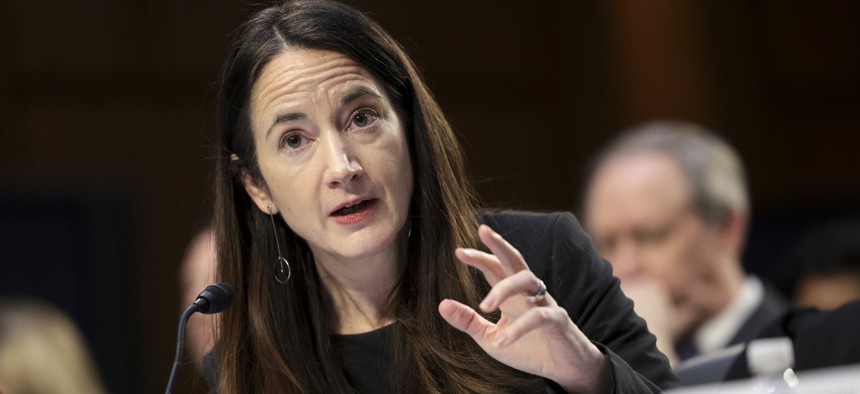National intelligence strategy calls for new partnerships to harness emerging technologies

Director of National Intelligence Avril Haines testifies before the Senate Intelligence Committee on March 10, 2022 . Kevin Dietsch/Getty Images
Federal agencies must collaborate with private sector partners and allies to better understand the implications of emerging technologies, according to the new strategy.
The National Intelligence Strategy calls for fostering new partnerships and tapping external perspectives to better identify critical emerging technologies and maintain strategic competitiveness against foreign adversaries.
The strategy, released on Aug. 9, outlines the Intelligence Community's top priorities for the next four years with six major goals, including delivering interoperable and innovative solutions at scale, as well as expanding capabilities and expertise on transnational challenges.
The document says the IC "must be able to identify the applications and implications of emerging technologies, understand supply chains and use economic statecraft tools" in partnership with key stakeholders to maintain economic and national security, alongside a strategic competition with nations that “layer authoritarian governance with revisionist foreign policy.”
Director of National Intelligence Avril Haines said in a statement accompanying the national strategy that the U.S. faces an "increasingly complex and interconnected threat environment" that presents "opportunities for new partnerships as well as new challenges" to national interests.
The strategy says the IC has to "deepen and expand" its collection and analytic capabilities by partnering with stakeholders throughout the public and private sectors to establish new systems that promote greater interoperability.
"The IC will invest in developing innovative methods and cultivating new sources, and work more systematically with allies and partners and public and private sector partners to facilitate a common understanding of technological and other risks and how to address them," the strategy says.
The strategy also tasks the IC with "harnessing open source, 'big data,' artificial intelligence and advanced analytics" to improve its insights into competitor capabilities and intentions. "The IC also must enhance its ability to understand how countries in every region of the world perceive, are implicated by and seek to navigate this new landscape."
A June report from the Government Accountability Office examining counterterrorism cooperation between federal agencies indicated that further action is needed throughout the IC to develop its information sharing environment. A December 2020 GAO report also said that the IC needs to strengthen its workforce diversity – a top goal outlined in the 2023 strategy.
The document says the IC "will modernize recruiting, hiring and vetting processes" to ensure it can "rapidly recruit and onboard a diverse, trusted, agile and expert IC workforce."
Christine Parker, acting senior adviser to the Chief Human Capital Officer for the National Security Agency, told Nextgov/FCW in April that her agency is looking to recruit and hire "the future workforce" in the coming years.
"We're thinking about our future of work," Parker said.
The NSA also announced its largest hiring initiative in 30 years with 3,000 new job openings in January, and plans to continue its recruitment efforts into the foreseeable future.
In her statement accompanying the strategy, Haines said its success will depend on “whether we can maintain a talented and diverse workforce” while “overcoming the challenges of a rapidly changing environment."






